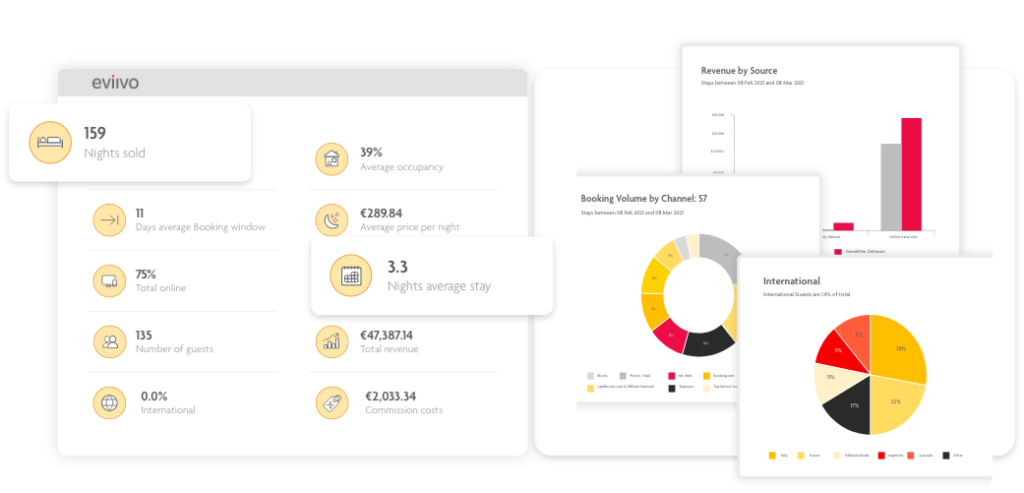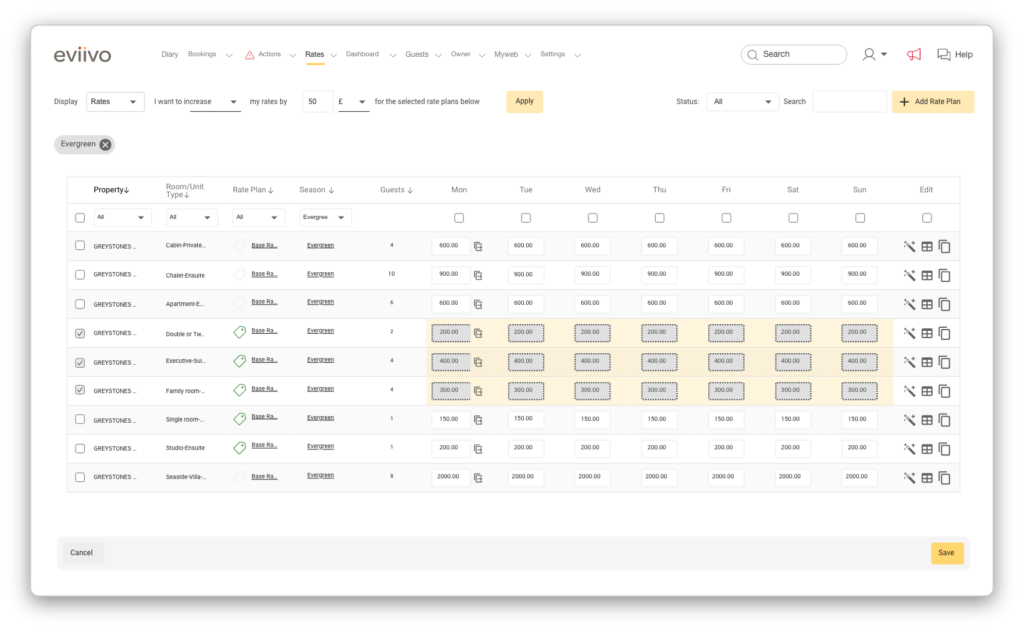The 2024 Summer Olympics have not only captivated sports fans but also sparked a surge in short-term rental supply. This trend prompts an important question: what can property managers do when the competition reaches Olympic levels?
Summer Olympics 2024: A Snapshot of the Vacation Rental Market
Data emerging around this year’s Olympics and the vacation rental market indicate a broader challenge facing property managers worldwide. As Paris plays host to the 2024 Olympic Games, Airbnb has reported a 40% increase in the number of active listings in the region compared to a year ago, alongside a 400% increase in total nights booked. Amidst this rapid upsurge in new hosts, our partners at Key Data have discovered that the rise in listings has corresponded with lower occupancy rates for property managers. Their findings show that the occupancy rate in Paris for the first day of the Olympics was down 6% on the previous year, from 21% to 15%.*
These findings exemplify broader trends in the vacation rental marketplace, where supply can surge quickly in response to large-scale events. In a suddenly crowded market, it often becomes difficult for established property managers to fill their units. As eviivo’s Managing Director for France, Guillaume Sniady, told Bloomberg in response to the Olympics occupancy trend: “A huge oversupply means most will be settling for bronze and silver rates instead of striking gold.”
As the fierce competition spills beyond the Olympic Stadium and into the vacation rental sphere, Key Data has presented three key strategies for property managers battling sudden market saturation. We recommend reading Key Data’s article on 2024 Paris Olympics Occupancy Rates in full here.
In our article below, we respond to Key Data’s recommendations to show how a combination of the right PMS and robust data analysis tools can help you win bookings when the competition reaches Olympic levels. Here are our three steps to staying competitive, whatever’s happening in your area.
Step 1: Put Data at Your Disposal
When the volume of competition in your area surges, staying ahead requires you to have a clear understanding of your properties and their place in the market. Having access to a wide range of data in your PMS (property management system) allows you to identify how your properties are performing. This gives you the insights you need to make strategic business decisions that improve occupancy and revenue.
A robust PMS should be able to organize all the booking, guest and property data that it holds into key figures, charts and reports that you can access whenever needed. Some of the most valuable key performance indicators (KPIs) to track include your:
- Average occupancy
- Average price per night
- Average booking window
- Booking volume
- Revenue (historical and forecast)
- Daily rate changes over time

However, for the extra level of insight needed to outperform your competition, you also need to know how other rentals in the area are performing…
Step 2: Keep Track of the Competition
Key Data recommends that property managers monitor the local market to see how their properties are faring against the competition. By connecting your PMS to tools that provide multi-market competitor benchmarking data, you can see exactly how your KPIs compare to the area’s averages.

Comparative benchmarking data helps contextualize your business performance, offering valuable insights into how you are performing against your competitors. This allows you to make more informed strategic decisions for your business. For example, if you’re a manager of short-term rentals in Paris, you could monitor averages across the city’s rentals in the run up to a major event like the Olympics. By doing so, you would see whether your properties are underperforming on occupancy and revenue. From there, you could use the trends you unearth to identify ways to keep pace with – or outperform – the competition.
This brings us to the final step. While having data on your properties and broader market trends is invaluable, it’s what you do with those insights that allows you to stay competitive as the market evolves.
Step 3: Use Your Insights to Optimize Your Pricing and Policies
The rapid increase in local short-term rental inventory leading up to the Olympics shows how quickly the market can change. Responding with agility is essential if you want to adapt and stay ahead of the competition. Therefore, ensure that your PMS allows you to update rates, listings, policies, and more easily across your properties. This will let you act fast in response to the insights you gain from your performance and benchmarking data.

Below, we discuss some of Key Data’s examples of how data can influence your strategic decision-making, showing how you can enact those decisions effortlessly with the right PMS.
Adjusting your room rates
An increase in competition requires you to pay close attention to your pricing, as competing providers undercut each other’s rates to stand out and secure bookings. Use comparative data to identify when and why to adjust your rates. Then make sure you can carry out those adjustments swiftly from within your PMS.
eviivo Suite allows you to make last-minute updates to rates from the Daily Rate screen. This makes it easy to tactically override your standard prices and take advantage of sudden shifts in the market. You’re also able to update rates in bulk across selected dates and rate plans.
If you want to respond instantly to real-time trends at your properties, you can also set up rules to dynamically adjust your room rates at a predetermined occupancy threshold. By setting rules to automatically lower rates when rooms need filling and raise them when you’re reaching maximum occupancy, you’ll keep your occupancy rates and revenue optimized without the legwork.
Running promotions
Key Data recommends monitoring average booking windows in the area to identify when occupancy dips, then applying promotions at just the right moment to entice travelers away from your competition.
Look for a PMS that enables you to create and manage promotions as needed. eviivo’s Promo Manager allows you to choose from a wide range of promotional rules that automatically modify your prices, including code-based promos, duration-based promos, and promos that run on specific channels. These promos can be set up in bulk and applied across your entire portfolio with ease. To encourage direct bookings, you also have the option to run “opaque” promos that are exclusive to your website and hidden from your competitors and OTAs (online travel agencies).
Updating your policies
Major events like the Olympics can significantly impact traveler trends and preferences. Depending on these shifts, it may be worth taking a more flexible approach to your pre-existing booking requirements and policies if you wish to outperform your competitors.
For example, Key Data looks at minimum stays as a specific policy that property managers may wish to rethink during major events like the Olympics, arguing that: “If your data shows many guests are seeking long weekends or 5-night stays in Paris around the Olympics, but your minimums require week-long bookings, you may miss out on significant revenue.” To help you stay responsive to similar changes in traveler preferences, eviivo Suite gives you several ways to update your minimum stay rules:
- Short-notice, strategic updates via Daily Rates
- Update minimums across multiple units, rates, and seasons via Rate Plans
- Update minimums by season via our Rate Plan Grid

By using your PMS to update your booking rules and requirements easily in response to your data findings, you can ensure you continually capture the most revenue and keep occupancy boosted.
Conclusion
The supply surge in the Paris vacation rental market this summer shows how important it is for managers to adopt a strategic and proactive approach at all times. Staying ahead of the competition requires having clear insight into seasonal and temporary trends, like the Olympics occupancy dip identified by Key Data.
To gather the insight needed to smoothly navigate changes to the rental market, leverage data that allows you to monitor your own business performance and benchmark against your competitors. Once equipped with these insights, ensure you have a robust PMS that enables you to optimize your pricing and policies proactively in response to shifting traveler needs. From there you’ll be ready to outpace the competition, no matter the season.
*Scraped data from Key Data, as of 5/25/24

